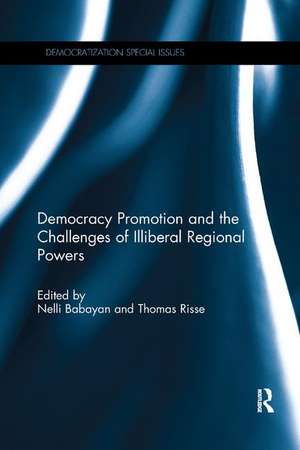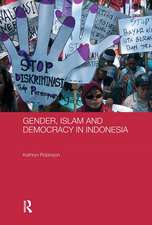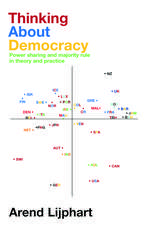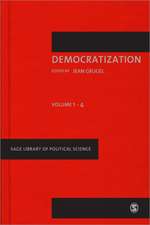Democracy Promotion and the Challenges of Illiberal Regional Powers: Democratization Special Issues
Editat de Nelli Babayan, Thomas Risseen Limba Engleză Paperback – 3 ian 2019
| Toate formatele și edițiile | Preț | Express |
|---|---|---|
| Paperback (1) | 409.51 lei 6-8 săpt. | |
| Taylor & Francis – 3 ian 2019 | 409.51 lei 6-8 săpt. | |
| Hardback (1) | 998.71 lei 6-8 săpt. | |
| Taylor & Francis – 8 apr 2016 | 998.71 lei 6-8 săpt. |
Din seria Democratization Special Issues
-
 Preț: 257.47 lei
Preț: 257.47 lei -
 Preț: 258.13 lei
Preț: 258.13 lei -
 Preț: 378.12 lei
Preț: 378.12 lei - 17%
 Preț: 258.09 lei
Preț: 258.09 lei - 17%
 Preț: 257.68 lei
Preț: 257.68 lei -
 Preț: 408.54 lei
Preț: 408.54 lei -
 Preț: 416.22 lei
Preț: 416.22 lei -
 Preț: 255.45 lei
Preț: 255.45 lei - 17%
 Preț: 258.09 lei
Preț: 258.09 lei - 12%
 Preț: 312.43 lei
Preț: 312.43 lei - 18%
 Preț: 995.70 lei
Preț: 995.70 lei -
 Preț: 415.24 lei
Preț: 415.24 lei - 17%
 Preț: 259.31 lei
Preț: 259.31 lei -
 Preț: 201.31 lei
Preț: 201.31 lei -
 Preț: 416.22 lei
Preț: 416.22 lei - 26%
 Preț: 850.19 lei
Preț: 850.19 lei - 25%
 Preț: 497.37 lei
Preț: 497.37 lei -
 Preț: 416.22 lei
Preț: 416.22 lei - 12%
 Preț: 312.43 lei
Preț: 312.43 lei - 17%
 Preț: 140.54 lei
Preț: 140.54 lei - 17%
 Preț: 259.98 lei
Preț: 259.98 lei - 12%
 Preț: 299.52 lei
Preț: 299.52 lei - 12%
 Preț: 298.41 lei
Preț: 298.41 lei - 18%
 Preț: 1216.52 lei
Preț: 1216.52 lei - 25%
 Preț: 525.19 lei
Preț: 525.19 lei - 17%
 Preț: 258.30 lei
Preț: 258.30 lei
Preț: 409.51 lei
Nou
Puncte Express: 614
Preț estimativ în valută:
78.36€ • 82.03$ • 64.84£
78.36€ • 82.03$ • 64.84£
Carte tipărită la comandă
Livrare economică 05-19 aprilie
Preluare comenzi: 021 569.72.76
Specificații
ISBN-13: 9781138391741
ISBN-10: 1138391743
Pagini: 178
Dimensiuni: 156 x 234 x 15 mm
Greutate: 0.3 kg
Ediția:1
Editura: Taylor & Francis
Colecția Routledge
Seria Democratization Special Issues
Locul publicării:Oxford, United Kingdom
ISBN-10: 1138391743
Pagini: 178
Dimensiuni: 156 x 234 x 15 mm
Greutate: 0.3 kg
Ediția:1
Editura: Taylor & Francis
Colecția Routledge
Seria Democratization Special Issues
Locul publicării:Oxford, United Kingdom
Public țintă
Postgraduate and UndergraduateCuprins
1. Democracy promotion and the challenges of illiberal regional powers 2. Democracy promotion and China: blocker or bystander? 3. Not as bad as it seems: EU and US democracy promotion faces China in Africa 4. The return of the empire? Russia’s counteraction to transatlantic democracy promotion in its near abroad 5. Spoiler or facilitator of democratization?: Russia’s role in Georgia and Ukraine 6. Undermining the transatlantic democracy agenda? The Arab Spring and Saudi Arabia’s counteracting democracy strategy 7. Local actors in the driver’s seat: Transatlantic democracy promotion under regime competition in the Arab world 8. The noble west and the dirty rest? Western democracy promoters and illiberal regional powers
Notă biografică
Nelli Babayan is a Fellow at the Transatlantic Academy in Washington, DC and Associate Fellow at the Center for Transnational Studies, Foreign and Security Policy, Freie Universität Berlin. She is the author of "Democratic Transformation and Obstruction: EU, US, and Russia in the South Caucasus" (2015).
Thomas Risse is Professor of International Relations at the Otto Suhr Institute of Political Science, Freie Universität Berlin. His latest publications include "A Community of Europeans? Transnational Identities and Public Spheres" (2010) and "European Public Spheres: Politics Is Back" (2014).
Thomas Risse is Professor of International Relations at the Otto Suhr Institute of Political Science, Freie Universität Berlin. His latest publications include "A Community of Europeans? Transnational Identities and Public Spheres" (2010) and "European Public Spheres: Politics Is Back" (2014).
Descriere
We usually portray the United States and the European Union as having mostly benign motivations and as spreading democracy and human rights over the world. At the same time, we tend to view illiberal regimes such as Putin’s Russia, as increasingly promoting autocracy, if not on a global scale, then at least in their respective spheres of influence. This book challenges this conventional wisdom.

















